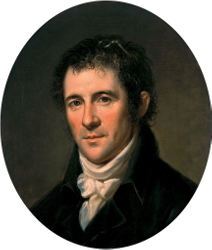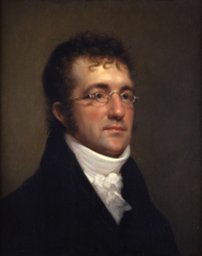Benjamin Latrobe (1764-1820)
 Click on image to enlarge or for higher resolution |
Title/Occupation | Engineer, Architect | ||
|---|---|---|---|---|
| Address | 55 The Strand | |||
| Artist | Charles Willson Peale | |||
| Date painted | 1804 | |||
| Credit | The White House | |||
| Married | Lydia Sellon (1790), Mary Elizabeth Hazelhurst (1800) | |||
| Parents | Benjamin &Anna Antes | |||
| Children | Lydia (1791-1878) Henry (1792-1817) Juliana(1801-1801) John (1803-1891) Juliana(1804-1890) Mary Agnes(1805-1806) Benjamin II (1806-1878) Louisa (1808-1808) | |||
| ||||
Wikipedia The wonderfully detailed elevations and survey of New Castle exist because there was a desire, mostly from Pennsylvania, for improved boat access to the farming regions in middle of the state. There was much debate about what the route should be between the Chesapeake Bay & Delaware River. Latrobe in a letter to his father-in-law stated the best route would end in New Castle! Pennsylvania governor Thomas McKean in 1801 appointed Benjamin Latrobe to survey, then improve the Susquehanna river. Then, when the Chesapeake & Delaware Canal Company was formed, McKean appointed Latrobe to be the engineer in charge (Hamlin p183, 203). In the summer of 1803, the Latrobes moved to New Castle. Benjamin would be away during the week, then on Friday his wife would drive a carriage to pick him up at Elk Forge (near the current Gore facility below Newark). Initially they lived at 55 The Strand (Toro, p33) Between 1803 and 1805 they lived in New Castle, Washington, D. C. where he was working on the Capitol dome, Philadelphia close to her family, Iron Hill, their preferred country location near to the feeder canal site and Wilmington. The Latrobe family's initial introduction to New Castle was not positive.
We arrived here about 11 o'clock [and] found the house
shut up. I was obliged to go in search of a key while
my family waited in the carriage in the street, surrounded
by the idlers and blackguards of the neighborhood
... The furniture of both parlors was covered with
white mould, the beds wet. One of the matrasses and
almost all of the carpets rotten.
His view of New Castle and its citizens did not improve during his stay:
There are half a dozen good natured men besides in this place. Physicians,
storekeepers, lawyers and a divine or two. None of them were ever suspected of
giving away anything in charity, or acquiring any thing by their genius. But to do no
wrong in Newcastle is praise worthy.
His parting comments in his Journal as he was moving to Washington:
It is no wonder indeed that talents and worth should be rare here. Newcastle cannot be a commercial town while Philadelphia exists. As soon as a merchant acquires capital, the field of Newcastle is too small for him and he removes to Philadelphia. Two exceptions exist however in the houses, of Riddle and Bird, and of Bond, who are supposed to have grown rich by supplying ships with Stock for their Voyages, a business in which they still continue and on a large Scale. The County court which is held here attracts two Judges and some Lawyers. But Wilmington is only six miles off and is a more healthy and agreeable residence, so that some of the lawyers of the most business and greatest eminence reside there. Judge Booth [Jr] is, excepting always my friend Bennet, the best and more accomplished man in the place, but not openhearted, and devoted to his farm, his tanyard, and his money concerns. He has as judge only $1,000 per Annum, and a large family to maintain. But he is reputed rich. Newcastle is the Gravesend of Philadelphia. Of course the usual conveniences for the accomodation of seafaring men are found here in plenty and of the coarsest sort. And as a little country town it has all the petty scandal, curiosity, envy and hatred which distinguishes little towns all over the world. I will not stay a moment longer in the place than I can help. And besides I will have no drawing of it, altho' I presented it with my professional labors in regulating it...
Newcastle Packet, Aug. 3D, 1806...
Philadelphia also did not fare well in Latrobe's candid description.Arrived at Newcastle at 2 o'clock. The Law of the Land says: "Thou shalt not travel on Sunday." Therefore we must remain here 14 hours uselessly, while a useless packet lies at the Wharf at French town, the crew of which as well as half the passengers of our Philadelphia Packet are getting drunk. This is at least not the Gospel, tho' it may be the law. I have taken two sketches in coming down the [Delaware] river... The wind failed near Newcastle. I wanted a view of the town merely as a geographical elevation of a place, in which all the evils of a Gravesend, and of County town are united. [Gravesend was the last river port for ships leaving the metropolis of London. New Castle played a similar role on the Delaware River for ships leaving Philadelphia.] I have several acquaintances in this place. The first of them is a tavernkeeper, and he is also the worthiest. [Caleb Bennett ... Another of my very good friends is a lawyer. [George Read Jr.] ... Another is a judge. [Kensey Johns Sr.] ... References: Benjamin Henry Latrobe, Talbot Hamlin, 1955 The Latrobe Survey of New Castle, Lucille Toro, Thesis, Univ. of Delaware, 1971 The Journals of Benjamin Henry Latrobe 1799-1820. From Philadelphia to New Orleans, Vol 3 E.Carter II, J. Van Horne, L. Formwalt. Md. Hist. Soc, 1980 | ||||
Jim Meek
nc-chap.org 2014, 2015
nc-chap.org 2014, 2015

